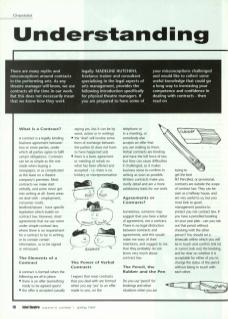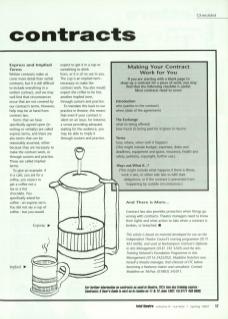What is a Contract?
A contract is a legally binding business agreement between two or more parties, under which all parties agree to fulfil certain obligations. Contracts can be as simple as the one made when buying a newspaper, or as complicated as the lease on a theatre company's premises. Most contracts we make start verbally, and some never get into writing at all. Some areas we deal with – employment, consumer credit, landlord/tenant – have specific legislation which builds on contract law. However, most agreements that we use come under simple contract law, where there is no requirement for a contract to be in writing, or to contain certain information, or to be signed or witnessed.
The Elements of a Contract
A contract is formed when the following are all in place:
- there is an offer (something ready to be agreed upon)
- the offer is accepted (usually saying yes, but it can be by word, action or in writing)
- the 'deal' will involve some form of exchange between the parties (it does not have to have happened yet)
- there is a basic agreement or meeting of minds on what has been offered and accepted – i.e. there is no trickery or misrepresentation
The Power of Verbal Contracts
I expect that most contracts that you deal with are formed when you say 'yes' to an offer made to you, on the telephone or in a meeting, or somebody else accepts an offer that you are making to them. Verbal contracts are binding and have the full force of law, but they can cause difficulties if challenged, so it makes business sense to confirm in writing as soon as possible. Written contracts make you clarify detail and are a more satisfactory basis for our work.
Agreements or Contracts?
Sometimes, someone may suggest that you have a letter of agreement, not a contract. There is no legal distinction between contracts and agreements, and this would make me wary of their intentions, and suggest to me that they probably do not know very much about contract law.
The Pencil, the Rubber and the Pen
Do you use 'pencil’ for bookings and other situations when you are trying to get the best fit? Pencilled, or provisional, contracts are outside the scope of contract law. They can be seen as a halfway house, and are very useful to us, but you must look to good management practice to protect you, not contract law. If you have a pencilled booking on your year plan – can you rub out that pencil without checking with the other person? You should set a timescale within which you will be in touch and confirm (ink in) or cancel (rub out) the booking, and be clear on whether it is acceptable for either of you to change the status of the pencil without being in touch with each other.
Express and Implied Terms
Written contracts make us cover more detail than verbal contracts, but it is still difficult to include everything in a written contract, and we may well find that circumstances occur that are not covered by our contract's terms. However, help may be at hand from contract law.
Terms that we have specifically agreed upon (in writing or verbally) are called express terms, and there are also terms that can be reasonably assumed, either because they are necessary to make the contract work, or through custom and practice. These are called implied terms.
To give an example: if in a cafe, you ask for a coffee, you expect to get a coffee not a tea or a hot chocolate. You specifically asked for coffee – an express term. You did not say a cup of coffee – but you would expect to get it in a cup or something to drink from, or it is of no use to you. The cup is an implied term – necessary to make the contract work. You also would expect the coffee to be hot, another implied term, through custom and practice.
To translate this back to our practice in theatre, this means that even if your contract is silent on an issue, for instance, a venue providing adequate seating for the audience, you may be able to imply it through custom and practice.
And There is More...
Contract law also provides protection when things go wrong with contracts. Theatre managers need to know their rights and what action to take when a contract is broken, or breached.
Making Your Contract Work for You
If you are starting with a blank page to draw up a contract for a piece of work, you may find that the following checklist is useful.
Most contracts need to cover:
Introduction
- who (parties to the contract)
- when (date of the agreement)
The Exchange
- what (is being offered)
- how (much is being paid for it/given in return)
Terms
- how, where, when (will it happen)
- This might include budget, expenses, dates and deadlines, equipment and space, insurance, health and safety, publicity, copyright, further use.
Ways out/What if...?
- This might include what happens if there is illness, work is late, or either side fails to fulfil their obligations, or if the contract is prevented from happening by outside circumstances.
This article is based on material developed for use on the Independent Theatre Council's training programme, and used at Roehampton Institute's Diploma in Arts Management and the Arts Training Network's Foundation Programme in Arts Management. Madeline Hutchins was herself a theatre manager, then Director of ITC before becoming a freelance trainer and consultant.


